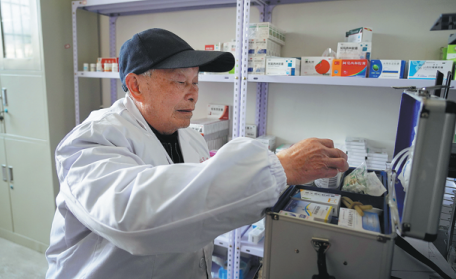Notification announcement
Aging society poses problem for nation's older doctors
Date:2023-05-30
Senior medics are concerned that China's health service may experience a shortage of qualified replacements when they step down. Li Lei reports.
Cao Huiling, 50, looked around her workplace and came to an unwelcome conclusion: Her employer, a county-level hospital in Xingping, Shaanxi province, was sliding into a demographic crisis.
Almost all of her 60-plus colleagues were age 45 or older, and many were approaching the legal retirement age, which is 55 for women and 60 for men.
"In just a few years, we will be running out of working-age doctors," said Cao, the only ear, nose and throat specialist at the hospital, a grade 2 facility under China's three-tier rating system.
One-doctor departments are prevalent in smaller county hospitals, which not only serve local residents but also those from nearby villages, she said. Only a few traditionally important departments such as obstetrics and emergency medicine have more staff members.
Long before the aging crisis was imminent, the hospital's human resources office had urged Cao and the doctors in charge of other departments to interview potential recruits and foster their "successors".
However, there were few applicants. In a major compromise, the office had in recent years dropped the applicant threshold of a five-year college degree in medicine and settled for the bare minimum for the highly trained profession. Now, applicants must have completed three years of medical training at a junior college.
Still, only a small number showed up for interviews. For the few medical graduates who opt to work there, the hospital — overshadowed by larger facilities in Xianyang and Xi'an, the provincial capital — only serves as a launch pad for their careers.
New recruits usually accept a starting salary of about 3,000 yuan ($425) a month for a couple of years, during which time they study part time and try to land jobs elsewhere.
Recruitment issues
"Recruiting new staff members is hard work," Cao said.
One of the biggest draws is Xi'an, which is just an hour's drive away but boasts average pay of more than 9,000 yuan a month, according to a 2022 report by recruitment website Zhaopin. Working there also means many noncash benefits such as access to local public services, which is more than Xingping, a county-level jurisdiction, can offer.
Most importantly, Xi'an ranks among the top medical hubs nationwide, with around 50 grade 3 hospitals, the highest-level health institutions with strong research capabilities. Practicing medicine in the city means greater access to patients with rare conditions, which can boost a doctor's clinical credentials and academic research. That's a major consideration in obtaining promotions and pay raises.
"The number of patients at our hospital is small, and therefore it is hard for young doctors to hone their skills here," Cao said.
In 1988, Cao graduated from middle school with outstanding scores. Following the practice among well-performing students at the time, she chose to study medicine at a health college in Hanzhong, a major city in the south of Shaanxi.
She spent four years there majoring in oral medicine, taking courses as varied as anatomy and pharmacology. Upon graduation, she returned to her home county and became a doctor with her current employer.
"When I had just left school, I was full of enthusiasm and wanted to do everything, such as perform surgery," she said. "But in that case, I would need a team — for example, an anesthetist in my department — but there wasn't one. That has greatly restricted my ability to spread my wings."
When Cao was recruited by the hospital in 1992, there was only one elderly doctor in the ear, nose and throat department, who Cao refers to as her "teacher". He retired a few years later, after Cao had served her apprenticeship. Other departments, from ophthalmology to dermatology to traditional Chinese medicine, also only have one doctor.
Therefore, when patients need major surgery, they must be transferred to larger hospitals in Xianyang and Xi'an, she said. "Our practitioners here are relatively weak," Cao said.
However, she said she never regrets her choice to return home.
"For my generation, there were no so-called choices after graduation. Personal wishes are secondary to taking care of the family," she added.
Long-standing problem
The aging of medics is not new. A study published by the medical journal The Lancet in 2017 found that the proportion of doctors in China age 25 to 34 had fallen from 31.3 percent to 22.6 percent since 2005. Meanwhile, the proportion age 60 and older rose to 11.6 percent in 2015, compared with just 2.5 percent a decade earlier.
The demographic shift is also affecting the rural areas. According to the 2022 China Health Statistics Yearbook, compiled by the National Health Commission, there were 599,000 rural clinics in some 490,000 villages across the country, and about 1.36 million rural health workers. However, about 50,000 rural health workers retire every year.
Cheng Jing, a deputy to the National People's Congress and also a professor at Tsinghua University's School of Medicine, highlighted the problem during this year's two sessions, the annual meetings of the NPC and the Chinese People's Political Consultative Conference.
He said rural doctors are generally older, and the problem is getting worse. The lackluster pay for rural health workers has resulted in the loss of young village practitioners. In addition, 60 percent of them only have a technical secondary school degree or lower, and only 6.7 percent have a bachelor's or higher.
"The overall quality of village doctors is not high," Cheng told China National Radio.
Zhou, a doctor of traditional Chinese medicine in a rural part of Macheng, Hubei province, said that about 20 years ago there could be as many as five rural medical professionals in each village, but now some settlements don't even have one.
"The clinics in some villages are just empty," said the 53-year-old, who asked to only be identified by his surname because he was not authorized to speak publicly.
"We post recruitment advertisements every year, but there are never any applicants."
Like many who pick up the trade in rural regions, Zhou learned his skills from his father. He was in his 20s when he took classes from his father, a village doctor who was an expert in the use of herbal medicines.
The younger Zhou taught himself about medicine and was admitted to a junior college in 2000. Later, he passed an exam and obtained a license as a qualified practitioner of TCM. "I was the first doctor in the local villages to get a license and get the highest degree," he said. "That's likely still the case, even after so many years."
Contact the writer at lilei@chinadaily.com.cn
(Source: China Daily)


